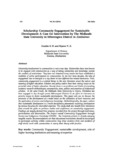Please use this identifier to cite or link to this item:
https://cris.library.msu.ac.zw//handle/11408/698| Title: | Scholarship community engagement for sustainable development: a case for intervention by the Midlands State University in Mberengwa district in Zimbabwe | Authors: | Gumbo, S.D. Nyawo, Vongai Z. |
Issue Date: | 2014 | Publisher: | Midlands State University | Series/Report no.: | The Dyke;Vol. 8, No. 3; p. 133-144 | Abstract: | University involvement in communities is not a new idea. Universities have been known to be engaged with communities as a way of taking scholarship and knowledge outside the confines of institutions. They have not remained ivory towers but have established a tradition of active participation in communities. In the last three decades, the idea of engagement has re-emerged as a key theme in two different but related literatures. First, community engagement is a central theme in the new literature about the nature and meaning of higher education. Scholars and policy makers have been raising issues on the potential value of higher education. Second, focus is on problems and limits of prevailing academic research methodologies, assumptions, aims, politics and practices of professional scholars. In the same breath, the Midlands State University in Gweru, Zimbabwe has been engaged in dry drought prone Mberengwa District in an effort to intervene on poverty issues to foster sustainable development. This paper sets out to discuss the processes of the development of a model based on the utilization of local resources and the application of science and indigenous knowledge. Methodologically, the paper realizes that sustainable development is a multi-disciplinary phenomena requiring participation by various faculties for diversified expertise. The study shall also benefit from literatures from around the globe on previous studies and conferences on community engagement. Findings are largely derived from progress recorded from the project through interviews, participation and observation. The project named Community Engagement through Science and Indigenous Knowledge (CESIK) – the Gomututu project, is already enjoying tangible results. Recommendations are that educational institutions should be encouraged to participate actively within communities they draw students from and members of staff should work with communities to marry their theory with practice. | URI: | http://hdl.handle.net/11408/698 | ISSN: | 1815-9036 |
| Appears in Collections: | Research Papers |
Show full item record
Page view(s)
166
checked on Jan 24, 2026
Download(s)
38
checked on Jan 24, 2026
Google ScholarTM
Check
Items in MSUIR are protected by copyright, with all rights reserved, unless otherwise indicated.




